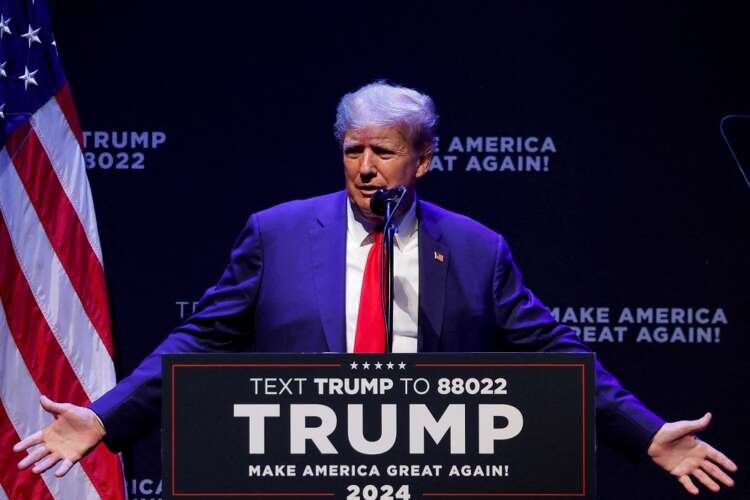Trump charges bring New York ‘zombie case’ back to life


By Luc Cohen
NEW YORK (Reuters) -Manhattan has started and stopped its investigation into Donald Trump’s hush-money payments to porn star Stormy Daniels so many times that it has come to be known as a “zombie case” like the mythical character who returns from the dead.
A grand jury of New Yorkers has brought charges against the former president, Trump’s lawyer Susan Necheles said on Thursday.
The charges were not immediately made public but emerged after Manhattan District Attorney Alvin Bragg revived a probe into whether Trump directed his former personal lawyer, Michael Cohen, to make the payment.
Cohen and Daniels have said the payment was to buy her silence about a sexual encounter she had with Trump in 2006 when Trump was married to his current wife Melania. Trump denies having had an affair with Daniels.
Manhattan District Attorney Alvin Bragg launched the probe after his predecessor Cyrus Vance twice looked into the payment and did not bring charges, in part because winning a conviction would rely on untested legal strategies, according to a new book by Mark Pomerantz, a former prosecutor in the office.
Doubts arose as to whether state felony charges could be brought against a candidate for federal office and whether the conduct could be considered money laundering, according to the book, “People vs. Donald Trump,” published in February.
The inquiry opened and shut so many times that it came to be known as a “zombie case,” Pomerantz said.
“The bottom line for me was that the ‘zombie’ case was very strong,” Pomerantz wrote. “But was it a crime under New York law?”
To be sure, it was as yet unknown whether Bragg was approaching the case with a similar legal theory to his predecessor.
Trump, who is seeking the Republican nomination for the presidency again in 2024, has called the probe a “witch hunt.” Bragg is a Democrat.
Bragg’s office did not immediately respond to requests for comment. Joseph Tacopina, another lawyer for Trump, said in television interviews before charges were filed that his client was a victim of extortion by Daniels, whose real name is Stephanie Clifford.
Late last year Bragg’s office won a conviction of Trump’s family real estate company on tax fraud charges. Trump was not a defendant in that case.
‘UNTESTED THEORY’
According to Pomerantz, Vance’s office looked into the payment in 2019, after federal prosecutors in the U.S. Attorney’s office in Manhattan finished their own case involving the hush money. Pomerantz was not yet working in the district attorney’s office at the time.
In the federal case, Cohen pleaded guilty to campaign finance violations and testified that Trump directed him to pay Daniels and another woman.
Federal prosecutors said Trump’s family real estate company reimbursed Cohen and falsely accounted for it as a legal expense, but never charged Trump with a crime.
Under New York state law, falsification of business records is a misdemeanor. It can become a felony if the intent is to conceal or advance another crime.
Pomerantz wrote that the DA’s office considered whether that other crime might be a violation of election laws. Such a theory would assert that Cohen’s payment was a campaign contribution because Daniels’ disclosure of the alleged encounter would have harmed Trump’s prospects at the polls.
But as Trump was a candidate for federal office, it was legally uncertain whether the intent to advance or conceal a federal crime could convert a state-level falsification of records charge into a felony, Pomerantz wrote.
“It’s an untested theory, but it’s not every day that a candidate for president violates a state law,” Jerry Goldfeder, an election law specialist at the Stroock law firm, said when asked before the charges were filed whether state law could apply to a candidate for federal office.
‘BACK INTO THE GRAVE’
After hiring an outside law firm for advice, Vance’s office decided not to bring any charges, Pomerantz wrote.
“These types of crimes don’t necessarily have a clean fit into the applicable law,” Sarah Krissoff, a partner at Day Pitney and a former federal prosecutor, said in an interview before the charges were filed.
In early 2021, after Pomerantz joined Vance’s team, he revived the hush money inquiry under a different theory: if Daniels had been extorting Trump, then the money could be considered criminal proceeds and efforts to conceal that it came from Trump could constitute money laundering.
But Pomerantz wrote that many of his colleagues were skeptical of the idea that Daniels’ request for hush money amounted to extortion, and he later realized the money laundering statute would not be applicable to the situation.
“The ‘zombie’ case,” Pomerantz wrote, “went back into the grave.”
(Reporting by Luc Cohen in New York; Editing by Noeleen Walder and Howard Goller)
Money laundering is the process of making illegally obtained money appear legitimate. It often involves a series of transactions that disguise the original source of the funds.
A grand jury is a legal body that is empowered to conduct official proceedings to investigate potential criminal conduct and determine whether criminal charges should be brought.
A felony is a serious crime, typically punishable by imprisonment for more than one year or by death. Felonies include offenses such as murder, robbery, and serious drug offenses.
A misdemeanor is a less serious crime than a felony, typically punishable by fines or imprisonment for less than one year. Examples include petty theft and minor assaults.
Explore more articles in the Top Stories category











